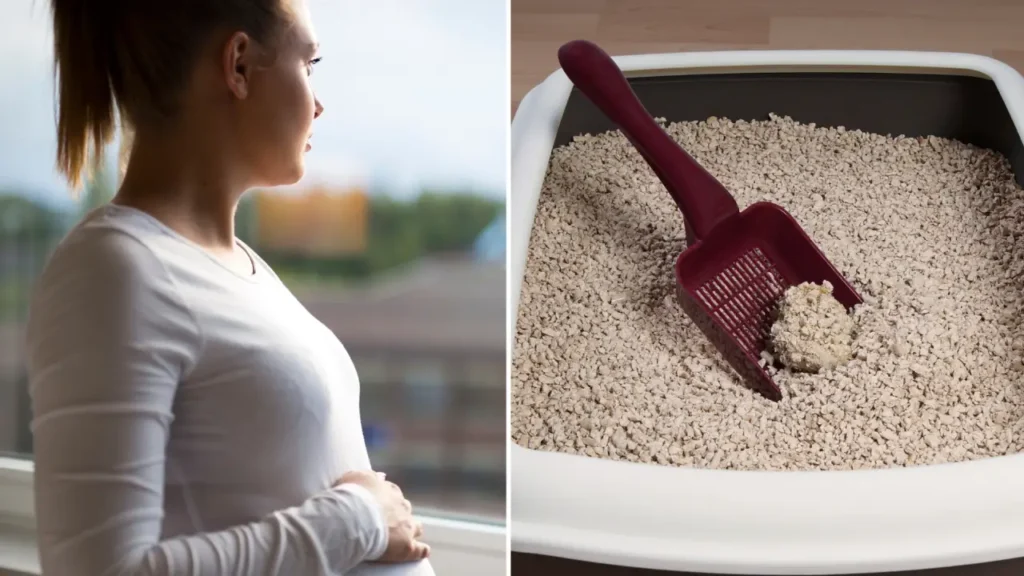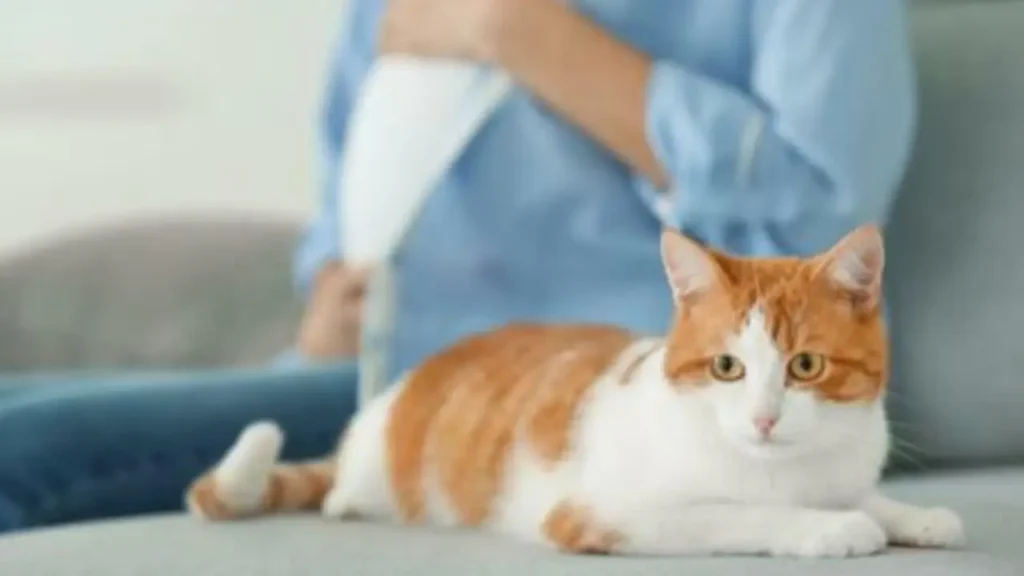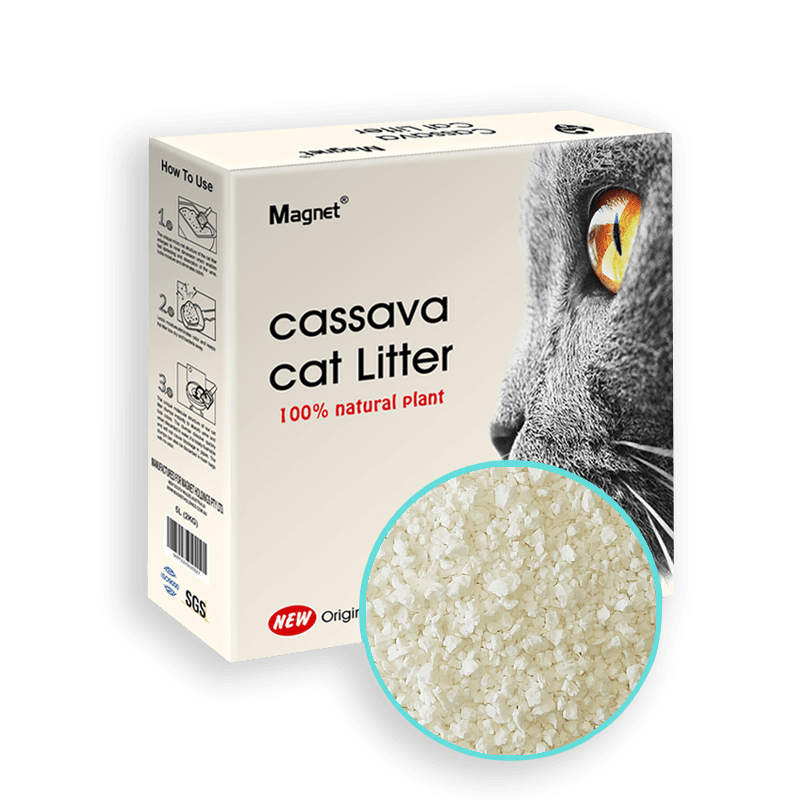Are you pregnant and concerned about cat litter safety? It’s a common question among expecting mothers. While cats can be wonderful companions, there are certain precautions to take to ensure your health and the well-being of your unborn baby.
In this blog post, we’ll discuss:
- Toxoplasmosis: A parasite found in cat feces that can pose a risk to pregnant women.
- Safe litter practices: Tips for handling cat litter safely during pregnancy.
- Alternative litter options: Exploring safer alternatives to traditional clay-based litters.
- Consulting with your doctor: The importance of seeking professional advice.
By following these guidelines, you can enjoy the companionship of your feline friend while minimizing any potential risks to your pregnancy.
Why Can’t Pregnant Women Change Cat Litter

Pregnant women should avoid changing cat litter due to the risk of toxoplasmosis. Toxoplasmosis is a parasitic infection that can be transmitted through contact with cat feces. While most people infected with toxoplasmosis experience no symptoms, the infection can be harmful to unborn babies.
If you are pregnant, it’s best to ask someone else to change your cat’s litter or wear gloves and a mask while doing it yourself. Additionally, make sure to wash your hands thoroughly with soap and water after handling cat litter.
Cat Litter Pregnancy Dangers: Toxoplasmosis
Cat litter can pose a risk to pregnant women due to the potential for exposure to toxoplasmosis. This parasitic infection can be transmitted through cat feces and can cause serious complications for unborn babies.
Toxoplasmosis is a parasitic infection caused by the Toxoplasma gondii parasite. Cats can become infected with this parasite by eating infected rodents or birds. The parasite’s eggs are then shed in the cat’s feces.
Pregnant women who become infected with toxoplasmosis for the first time during pregnancy are at risk of passing the infection to their unborn baby. This can lead to serious complications, including miscarriage, stillbirth, and birth defects.
However, it’s important to note that most cats infected with toxoplasmosis do not show any symptoms. This means that it can be difficult to know if your cat is infected.
Safe Litter Practices for Pregnant Women
To minimize the risk of toxoplasmosis, pregnant women should take the following precautions:
- Avoid changing cat litter: If possible, ask someone else to change your cat’s litter.
- Wear gloves and a mask: If you must change the litter yourself, wear gloves and a mask to protect yourself from exposure to cat feces.
- Wash your hands thoroughly: Wash your hands thoroughly with soap and water after handling cat litter or coming into contact with your cat.
- Keep your cat indoors: Keeping your cat indoors can help prevent it from becoming infected with toxoplasmosis.
Alternative Litter Options
If you’re concerned about the risk of toxoplasmosis, there are alternative litter options available that can be safer for pregnant women:
- Enclosed litter boxes: These boxes can help contain cat litter and prevent it from spreading throughout your home.
- Disposable litter liners: Disposable litter liners can make it easier to clean the litter box and reduce your exposure to cat feces.
- Non-clay litters: Some non-clay litters, such as silica gel or recycled paper, may be a safer option for pregnant women.
It’s important to consult with your doctor before making any changes to your cat’s litter routine. They can provide personalized advice based on your specific circumstances.
By following these guidelines, you can enjoy the companionship of your feline friend while protecting your health and the well-being of your unborn baby.
Can You Clean Cat Litter When Pregnant

Why can’t you clean cat litter when pregnant?
It’s generally recommended that pregnant women avoid changing cat litter.
This is because there is a risk of exposure to toxoplasmosis, a parasitic infection that can be harmful to unborn babies.
If you are pregnant, it’s best to ask someone else to change your cat’s litter. However, if you must do it yourself, here are some precautions you can take:
- Wear gloves and a mask: This will help protect you from exposure to cat feces.
- Wash your hands thoroughly: Wash your hands with soap and water after handling cat litter or coming into contact with your cat.
- Consider using a disposable litter box liner: This can make cleaning up easier and reduce your exposure to cat feces.
It’s important to consult with your doctor for personalized advice regarding your specific situation.
Is Cat Litter Toxic to Pregnant Woman
Yes, cat litter can be toxic to pregnant women if it contains harmful substances or if it is not handled properly.
The primary concern is toxoplasmosis, a parasitic infection that can be transmitted through cat feces. Pregnant women who become infected with toxoplasmosis for the first time during pregnancy are at risk of passing the infection to their unborn baby. This can lead to serious complications, including miscarriage, stillbirth, and birth defects.
To minimize the risk of toxoplasmosis:
- Avoid changing cat litter: If possible, ask someone else to handle this task.
- Wear gloves and a mask: If you must change the litter, wear protective gear.
- Wash your hands thoroughly: Always wash your hands with soap and water after handling cat litter or coming into contact with your cat.
- Consider alternative litter options: Some non-clay litters may be a safer choice for pregnant women.
It’s crucial to consult with your doctor for personalized advice. They can provide specific recommendations based on your individual situation and any underlying health conditions.
Can a Pregnant Woman Change Cat Litter With Gloves
While wearing gloves can help reduce your exposure to cat feces, it’s still recommended that pregnant women avoid changing cat litter altogether.
The primary concern is the risk of toxoplasmosis, a parasitic infection that can be harmful to unborn babies. Even with gloves, there’s a chance of accidental contact or inhalation of airborne particles that may contain the parasite.
If possible, it’s best to ask someone else to handle the litter. If that’s not an option, consider using disposable litter liners or enclosed litter boxes to minimize your exposure.
Always consult with your doctor for personalized advice regarding your specific situation.
Why Can’t Pregnant Women Be Around Cat Litter

Is it ok to be around cat litter while pregnant? No
Pregnant women should avoid changing cat litter due to the risk of toxoplasmosis.
Toxoplasmosis is a parasitic infection that can be transmitted through contact with cat feces. While most people infected with toxoplasmosis experience no symptoms, the infection can be harmful to unborn babies.
If you are pregnant, it’s best to ask someone else to change your cat’s litter or wear gloves and a mask while doing it yourself. Additionally, make sure to wash your hands thoroughly with soap and water after handling cat litter.
By taking these precautions, you can minimize your risk of exposure to toxoplasmosis and protect the health of your unborn baby.
Can You Smell Cat Litter When Pregnant
Yes, pregnant women can smell cat litter, but not recommended to do so.
However, the ability to smell can vary from person to person, and some women may be more sensitive to odors than others.
It’s important to note that while you may be able to smell cat litter, it’s not necessarily harmful to your health. The main concern for pregnant women is the risk of exposure to toxoplasmosis, a parasitic infection that can be transmitted through cat feces.
To minimize the risk of toxoplasmosis, it’s best to avoid changing cat litter or wear gloves and a mask while doing so. Additionally, make sure to wash your hands thoroughly with soap and water after handling cat litter or coming into contact with your cat.
Conclusion
While cats can make wonderful companions, it’s important for pregnant women to take precautions to minimize the risk of exposure to toxoplasmosis. This includes avoiding changing cat litter or wearing protective gear and washing your hands thoroughly.
If you’re concerned about the safety of cat litter during pregnancy, it’s a good idea to consult with your doctor for personalized advice. They can provide specific recommendations based on your individual situation and any underlying health conditions.
If you’re looking for high-quality cat litter that meets the needs of both you and your feline friend, consider contacting our cat litter manufacturer for wholesale pricing. We offer a variety of safe and effective litter options that are perfect for pregnant women and their cats.
Contact us today to learn more and get a quote!









